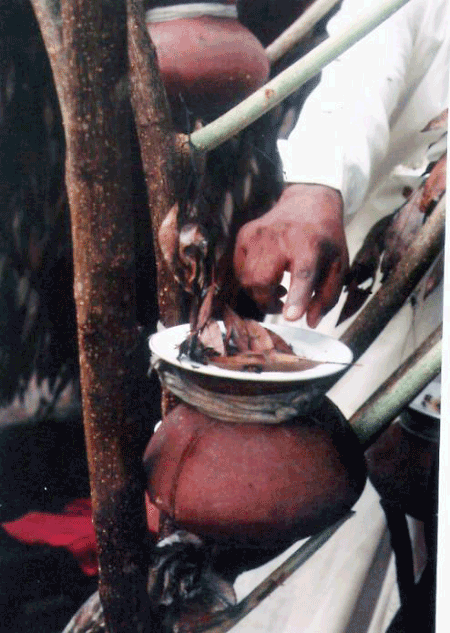“I consider this is an occasion when, in keeping with the traditions of the navy, you have discharged in full measure your pledge to defend the unity, sovereignty and territorial integrity of the motherland; you have proved by this success that the Sri Lanka Navy is capable of defeating any enemy force within Sri Lanka’s territorial waters or in international waters.” So said President Mahinda Rajapaksa in his special Message of Tribute to members of the Sri Lanka Navy, who participated in the successful attack on the LTTE’s arms vessels last week.
The President was participating in the official ceremonial reception at the Trincomalee Naval Base to pay national tribute to the navy personnel who took part in destroying the three LTTE arms vessels in international waters.
President Rajapaksa’s message said that in the prevailing situation, when the LTTE has been weakened militarily, the interdiction of the means of its obtaining arms from outside sources and thereby weakening them further is major victory for people and the country.
In this attack the Sri Lanka Navy destroyed what is considered a major floating arms storehouse of the LTTE, and led to the destruction of a large quantity of arms, ammunition and aircraft parts that were destined for the LTTE’s armoury.
Honoured in this ceremony were the crews of the naval vessels, the flagship SLNS “Sayura”, SLN vessels “Samudura”, “Shakthi” and “Suranimala”, and the two naval supply vessels 520 and 521 that participated in this successful attack on the LTTE vessels.
This ceremony of tribute was organized in keeping with the naval tradition of honouring sailors who return home after a successful naval exercise in the high seas against an enemy.
The attack by the Navy destroyed the LTTE arms transport vessels “Manyoshi”, “Seshin” and “Portia” nearly 600 nautical miles (1,600 km) south east of Dondra Head at the southern tip of Sri Lanka, on September 10 & 11. The destruction of these vessels and their huge cargo of warlike material have dealt a severe blow to the LTTE’s military capabilities, which comes after the Sri Lankan Forces have cleared the Eastern Province of LTTE terrorists and also cleared of the LTTE’s control of its key infiltration and Sea Tiger staging bases at Silavatura and Ariyala areas near Mannar.
The President’s Message also said: “I hereby declare my deep satisfaction and appreciation of your challenging and heroic exercise in destroying the enemy vessels in the face of the heavy firing by the terrorists.
“It must be clearly stated that by preventing arms getting into the hands of the enemy you have saved a large number of lives.
“By this victory you have demonstrated your patriotism, dedication to duty, collective capability, determination, and the success of your training and professionalism. By this means the honour and respect of the Sri Lanka Navy reaches greater heights, and this action will be writ in gold in the history of our Navy.
“May you have the strength and courage to achieve such victories in the future, too’”.
On his arrival President Rajapaksa reviewed the vessels of Navy that participated in the attack on the LTTE craft as they were ceremonially escorted to the Trincomalee Harbour by Navy vessels, to receive the Tribute of the Nation. Later the President was accorded a Guard of Honour by 100 members of the Sri Lanka Navy at the Trincomalee Naval Jetty.
After the ceremony of National Tribute to the Navy, the President declared open the new naval jetty of the Sri Lanka Navy’s Eastern Base at Trincomalee, built entirely by the civil engineers of the Sri Lanka Navy. “Jetliner” the passenger vessel that had earlier come under attack by the LTTE when it was transporting large numbers of security forces personnel returning on leave, which is also used by the Navy to transport civilians between Kankesanturai and Trincomalee, was the first vessel to lay anchor at new jetty.





